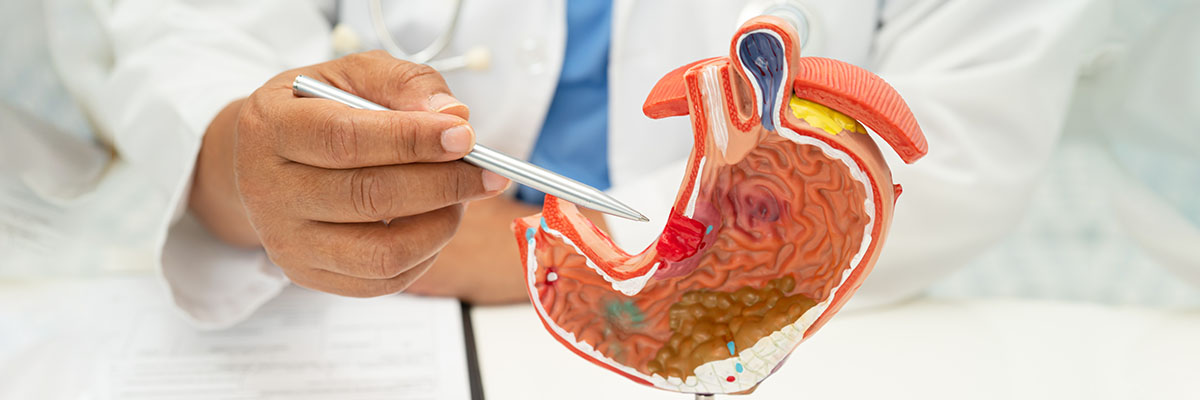Overview
Stomach cancer, also known as gastric cancer, occurs when abnormal cells grow uncontrollably in the stomach lining. It is a global health concern and is more common in older adults. Several risk factors contribute to stomach cancer, including a diet high in salty or smoked foods, chronic infection with Helicobacter pylori, smoking, and a family history of the disease. Early detection is often challenging as symptoms may be vague or absent in the initial stages.
The effects of stomach cancer depend on its stage and location. Early-stage symptoms may include indigestion, bloating, mild nausea, or loss of appetite. As the cancer progresses, symptoms can become more severe, such as unexplained weight loss, persistent stomach pain, vomiting (sometimes with blood), difficulty swallowing, and noticeable fatigue. Advanced stages may result in complications like obstruction of the stomach or bleeding.
Treatment for stomach cancer varies based on the stage of the disease and the patient’s overall health. Surgical options, such as partial or total gastrectomy (removal of part or all of the stomach), are common for localized cancer. Chemotherapy and radiation therapy are often used alongside surgery to shrink the tumor or eliminate remaining cancer cells. Targeted therapy and immunotherapy are emerging treatments that provide additional options, especially for advanced or metastatic cases.
Early detection through regular medical check-ups and attention to persistent gastrointestinal symptoms is crucial for successful treatment. Lifestyle modifications, such as a balanced diet and avoiding smoking, along with advancements in treatment techniques, continue to improve survival rates and quality of life for those diagnosed with stomach cancer.
Table of Contents
When to See a Doctor
It is essential to seek medical advice if you experience persistent symptoms that may indicate stomach cancer. Early detection can significantly improve treatment outcomes and quality of life.

Signs to see a doctor:
- Persistent indigestion or bloating. If you have ongoing indigestion, heartburn, or a feeling of fullness after eating small amounts of food, it may warrant further evaluation.
- Unexplained weight loss. Sudden or significant weight loss without trying could signal an underlying issue, including stomach cancer.
- Stomach pain or discomfort. Persistent or worsening pain in the abdomen, particularly in the upper stomach area, should not be ignored.
- Difficulty swallowing. Experiencing pain or discomfort while swallowing, especially if it becomes more frequent, may indicate a problem that needs medical attention.
- Vomiting blood or blood in stool. Vomiting blood or noticing blood in your stool (which may appear dark or tar-like) could indicate advanced stomach issues, including cancer.
- Family history or high-risk factors. If you have a family history of stomach cancer, chronic Helicobacter pylori infection, or other risk factors like smoking or a diet high in salty and processed foods, you should consider regular screenings.
If these symptoms persist for more than two weeks or worsen over time, it is critical to consult a healthcare provider, such as a gastroenterologist. Early intervention can lead to timely diagnosis and effective treatment, potentially improving outcomes significantly.
What Type of Doctor to Seek
If you suspect stomach cancer or experience symptoms such as persistent indigestion, abdominal pain, or unexplained weight loss, your first step should be to consult a primary care physician or a gastroenterologist. Gastroenterologists specialize in diagnosing and managing conditions of the digestive system, including the stomach. They can perform tests such as endoscopy, biopsy, or imaging studies like a CT scan to identify abnormalities and confirm the presence of cancer.
If stomach cancer is diagnosed or strongly suspected, you will likely be referred to an oncologist, a doctor specializing in cancer treatment. Depending on the stage of the cancer, you may see a medical oncologist for chemotherapy, a surgical oncologist for procedures such as gastrectomy, or a radiation oncologist for radiation therapy. In many cases, a multidisciplinary team collaborates to provide a comprehensive treatment plan tailored to your specific needs.
What to Expect from Your Visit to a Doctor
When visiting a doctor for concerns about stomach cancer, your appointment will typically begin with a detailed discussion of your symptoms, medical history, and any risk factors, such as family history, diet, or smoking habits. The doctor may perform a physical examination, focusing on your abdomen to check for tenderness, swelling, or other abnormalities. Based on your symptoms, the doctor may recommend additional diagnostic tests.
Common diagnostic procedures include blood tests to check for anemia or tumor markers, imaging studies like a CT scan or ultrasound, and an endoscopy to visually examine the stomach lining. During an endoscopy, the doctor may take a biopsy (a small tissue sample) to test for cancer. Once results are available, the doctor will discuss the findings and outline potential next steps, including further tests or a treatment plan. This is also an opportunity to ask questions and address any concerns you may have about your diagnosis and options moving forward.
Stomach Cancer Treatment Options

Stomach cancer is a serious condition that requires prompt and comprehensive treatment to prevent further complications. Depending on the stage and type of cancer, patients may undergo one or more of the following treatments to control the disease and improve outcomes:
- Surgery. Surgery is often the first choice for treating stomach cancer, especially in its early stages. Depending on the tumor’s location and size, the surgeon may perform a partial gastrectomy (removal of part of the stomach) or a total gastrectomy (removal of the entire stomach). While surgery is effective in removing visible tumors, follow-up treatments may be needed to address any remaining cancer cells and reduce the risk of recurrence.
- Radiation therapy. Radiation therapy uses high-energy rays, such as X-rays, to shrink and destroy cancer cells in the stomach. This treatment is often combined with chemotherapy to increase its effectiveness. Although radiation can help control the spread of cancer, side effects like nausea, diarrhea, and fatigue are common and need to be managed.
- Chemotherapy. Chemotherapy involves the use of powerful drugs to kill cancer cells or stop their growth. It is commonly administered before surgery to shrink tumors or after surgery to eliminate remaining cancer cells. Chemotherapy is also effective for managing advanced or metastatic stomach cancer.
- Targeted drug therapy. Certain medications, such as trastuzumab, ramucirumab, imatinib, sunitinib, and regorafenib, are designed to specifically target cancer cell pathways, slowing their growth and spread. These drugs are particularly effective in cases where the cancer is resistant to traditional treatments or when genetic testing identifies specific mutations.
- Immunotherapy. Emerging as a promising option, immunotherapy boosts the immune system’s ability to recognize and attack cancer cells. This treatment is often used for advanced stomach cancers that have not responded to other therapies.
Each treatment is tailored to the patient’s specific condition and needs. A combination of these methods, along with lifestyle adjustments and supportive care, can improve survival rates and quality of life for those battling stomach cancer. Regular follow-ups and advancements in treatment continue to provide hope for better outcomes.
Stomach Cancer Prognosis
The prognosis for stomach cancer depends on the stage at which it is diagnosed, the type of cancer, and the treatments employed. Each treatment option offers varying levels of effectiveness based on individual circumstances. Here’s an overview of the prognosis for the main treatment options:
- Surgery. Surgery has a strong prognosis for early-stage stomach cancer, often leading to a complete cure when the cancer is localized. For advanced cases, surgery can alleviate symptoms and improve quality of life, though additional therapies may be necessary to control the disease.
- Radiation therapy. Radiation therapy is effective in reducing tumor size and slowing the progression of cancer. It is particularly beneficial when combined with other treatments, like chemotherapy, to enhance results. While it may not cure advanced cancer alone, it often extends survival and helps manage symptoms.
- Chemotherapy. Chemotherapy offers a positive prognosis for many patients, especially when used as part of a multimodal treatment plan. It is effective in controlling cancer growth, reducing tumor size, and improving survival rates, particularly for advanced or metastatic cases.
- Targeted drug therapy. Targeted therapies have shown significant success in prolonging survival for patients with advanced stomach cancer, especially when genetic mutations are present. These treatments are often less damaging to healthy cells, resulting in fewer side effects compared to traditional chemotherapy.
- Immunotherapy. Immunotherapy provides hope for patients with advanced or treatment-resistant stomach cancer. While still being studied, it has shown success in improving survival rates and quality of life for certain patients.
Early detection and a tailored treatment plan are key to achieving the best possible outcomes for stomach cancer. Combining treatments and leveraging advances in medical technology continue to improve survival rates and quality of life for patients facing this challenging disease.


